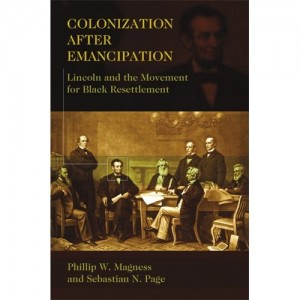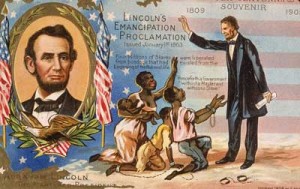According to the National Center for Education Statistics (2008), 90 percent of American students attend public schools. Unfortunately, overcrowded classrooms, violence, and truancy are just some of the problems that have plagued public school education in America for decades.
As a result, we are confronted almost daily with data showing that American students routinely perform at levels well below their counterparts in other OECD member countries. And nowhere is this more manifest than in their knowledge (or lack thereof) of history.
 Only this explains why a new book regurgitating old facts about the most written about president of the United States, Abraham Lincoln, is receiving so much attention. The book, Colonization After Emancipation, purportedly presents new evidence from the British National Archives about Lincoln’s efforts to colonize freed blacks.
Only this explains why a new book regurgitating old facts about the most written about president of the United States, Abraham Lincoln, is receiving so much attention. The book, Colonization After Emancipation, purportedly presents new evidence from the British National Archives about Lincoln’s efforts to colonize freed blacks.
For the sake of your race, you should sacrifice something of your present comfort for the purpose of being as grand in that respect as the white people.
This, according to authors Phillip Magness and Sebastian Page, is how Lincoln exhorted blacks in free states to take their freedom and go to Central America to set up their own separate, even if unequal, black nation. In a March 4, 2011 report by NPR, Magness and Page claim to have extracted this quote from a heretofore little-known speech Lincoln gave at the White House in 1862. They suggest that Lincoln’s white nationalism was so acute that he went so far as to call blacks “selfish” for resisting his exhortation.
To be fair, however, Lincoln was not advocating a pogrom or mass deportation. Instead, he was proposing a voluntary separation based on the prevailing view of the day – even among abolitionists – that:
…unconquerable prejudice resulting from their color, they never could amalgamate with the free whites of this country. It was desirable, therefore, as it respected them, and the residue of the population of the country, to drain them off.
(Henry Clay as quoted by Maggie Montesinos Sale, The slumbering volcano: American slave ship revolts and the production of rebellious masculinity. p.264. Duke University Press, 1997)
In fact, by the time Lincoln gave his supposedly revelatory speech in 1862, Clay and other founding members of the American Colonization Society had already been working for over 45 years to “repatriate blacks to greater freedom in Africa.” And Exhibit A in this regard was the founding of Liberia in 1847.
So the only thing newsworthy about Colonization After Emancipation is its account of Lincoln’s focus on Central America instead of Africa as a more hospitable destination for blacks. And Exhibit A in this regard was Belize, where American slaves were being exhorted to join British slaves who were emancipated there in 1838.
 That said, it is general knowledge that Lincoln favored the gradual emancipation of slaves long before he was elected president. But, just like the Founding Fathers, he subjugated the moral imperative to free them to the political realities that kept them in bondage.
That said, it is general knowledge that Lincoln favored the gradual emancipation of slaves long before he was elected president. But, just like the Founding Fathers, he subjugated the moral imperative to free them to the political realities that kept them in bondage.
Ultimately, political necessity (i.e., winning the Civil War) compelled him to emancipate only those slaves living in states not under his/Union control. This is why Lincoln’s Emancipation Proclamation is as compromised as Article I of the U.S. Constitution, which counted blacks as only three-fifths of a person.
Here, in fact, is the poignant way William Seward, Lincoln’s secretary of state, reflected on this second-most infamous compromise on the humanity and liberty of black folks in U.S. history:
We show our sympathy with slavery by emancipating slaves where we cannot reach them and holding them in bondage where we can set them free.
(Africans in America, pbs.com)
The hypocrisy is palpable even today. More to the point, though, the same political necessity that compelled him to emancipate the slaves also caused Lincoln’s views about colonizing blacks to evolve. Specifically, he came to believe that blacks who enlisted in the Union army had duly earned their right to live as free men (albeit as second-class citizens) in the United States. Indeed, it is well known that the unselfish role blacks played in helping him win the Civil War moved Lincoln to “slough off colonization” – as his presidential secretary, John Hay, reportedly wrote in July 1864.
In any event, Magness and Page discovering new evidence which indicates that Lincoln was more in favor of colonizing blacks than previously known is rather like me discovering new evidence which indicates that Governor George Wallace of Alabama was more committed to segregation than previously known. Duh.
Class dismissed.
NOTE: As one who grew up under British colonial rule, I always accepted as an article of faith that public school education in the UK was far superior to that offered in the U.S.
Imagine my surprise therefore when I read media accounts recently about the way a “rebel teacher” named Katharine Birbalsingh was sending shockwaves through the UK by criticizing public school education there for being plagued with all of the same problems associated with public school education in the U.S. Alas, it seems the sun is setting rather closer to home these days….
Miss Birbalsingh lectures on point here.